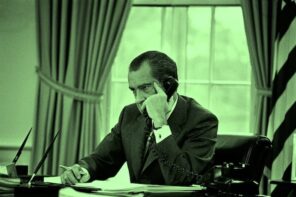I’ve said it before, and if you’re reading this, you’ve very likely heard the same thing darkly muttered among liberals and progressives if you haven’t said it yourself: I never thought anything could possibly make me miss Attorney General Jefferson Beauregard Sessions III. And yet, with his willingness to throw away our norms, checks, and balances, to politicize the Justice Department, to sacrifice the rule of law itself on the altar of Trump—current Attorney General William Barr has done it. As authoritarian as he was, invoking Romans 13 to defend the Trump administration’s indefensibly inhumane policy of caging children separated from their asylum-seeking parents, Sessions had at least enough genuine concern for the rule of law to recuse himself from the Mueller investigation, against the tweeter-in-chief’s explicit wishes.
In other ways, however, Sessions and Barr are clearly cut from the same cloth. Sessions, a Methodist, has asserted that without belief in God it is impossible to believe in truth, suggesting that non-believers are unfit to serve in government. In recent months, Barr, a Catholic, has expounded the same views much more forcefully and at much greater length, including in a speech he delivered Wednesday at the National Religious Broadcasters Convention in Nashville. NRB is an international evangelical organization whose board members include John Fuller of far-right powerhouse Focus on the Family and Tim Wildmon of the American Family Association, a Southern Poverty Law Center designated anti-LGBT hate group.
Featuring predictable dog whistles about “federalism” (i.e., “states’ rights”) and “the corporate—or ‘mainstream’—press,” Barr’s speech to NRB was divided into sections focusing on “religion, the decentralization of government power, and the free press,” all of which, Barr claims, have “have eroded in recent decades.” But today I’ll focus largely on Barr’s view of religion and its ideal place in society and the public sphere.
Barr’s exposition weaves together a variety of reactionary tropes, many of which have roots in the nineteenth century. (While it would be impossible to tease them apart and trace their relationships and genealogies in a short commentary, for those interested in an academic unpacking of Barr’s rhetoric, “The Russian Origins of the So-Called Post-Secular Moment: Some Preliminary Observations,” which I wrote for State, Religion and Church, will provide a helpful overview.)
The attorney general’s speech was likewise full of so many tensions, contradictions, and weak arguments that it resembles the “Gish gallop” style of debate, making it difficult to believe that they were all offered in good faith. In typical Christian nationalist form, Barr quoted American Founding Father John Adams: “We have no government armed with the power which is capable of contending with human passions unbridled by morality and religion. Our Constitution was made only for a moral and religious people. It is wholly inadequate for the government of any other.”
Asked to comment, Freedom From Religion Foundation’s Andrew Seidel, author of The Founding Myth: Why Christian Nationalism is Un-American, maintained, “Barr is misreading Adams.” To substantiate the point, he observed, “Adams, like the other founders, thought religion and morality were two separate entities; Barr thinks they are one and the same. The founders thought religion could be a substitute for morality. We now know that they were wrong on this point.”
What Seidel means here, as he details in his book, is that as Enlightenment elites, the Founding Fathers believed that they were educated and cultivated enough to be moral without religion, but that the masses were too uncultivated to do the same. The masses would therefore require religion. Seidel maintains that the founders were wrong on this point, and we can admit as much while still admiring their positive achievements.
Seidel adds, “If the founders believed that religion was important to ensure moral behavior for the masses but not for themselves, that means that the founders were moral without religion. It also means they founded the American government on their own morality, not religion,” concluding that “Barr is inadvertently refuting his entire argument by trying to co-opt Adams.”
Seidel’s work can also help us see that Barr is twisting Tocqueville in his attempt to marshal the nineteenth-century French observer of American democracy in support of his view that moral behavior is impossible without religion. A claim, by the way, that is entirely fact-free.
And Seidel is certainly correct that Sessions and Barr go much further than the Founding Fathers in claiming, as Barr did in his NRB speech, that moral values “must flow from a transcendent Supreme Being.” Despite Barr’s whiggish praise of “the Anglo-American political system” and his espoused disdain for Enlightenment thinker Jean-Jacques Rousseau, his views on the necessity of an external, transcendent source of morals in order for humans to achieve virtue is much more prominent in Continental European thought than in the English-speaking world.
But Barr is a smooth gaslighter, and he represents his argument for theocratic authoritarianism as a defense of “liberal democracy.” Barr’s European (and sometimes American) antecedents were often more honest, admitting that they viewed liberal democracy, due to its supposed godlessness and concomitant lack of truth, as a failure that would have to be replaced with either “totalitarianism” (the “ersatz religions” of fascism or Communism) or “a religious society.”
Indeed, Barr’s claim that “the right way to transform the world is for each of us to focus on morally transforming ourselves” is almost a direct quote from the early twentieth-century anti-Communist Nikolai (Nicholas) Berdyaev, who might well have influenced the attorney general, if not directly, then through Berdyaev’s profound influence on late Soviet dissident Alexander Solzhenitsyn, whom he cites. While Solzhenitsyn’s bravery in exposing the brutal Soviet GULAG system of prison camps should never be forgotten, Solzhenitsyn was no fan of the West.
In 1978, he gave a famous speech lambasting the West’s supposed decline in terms that would surely be congenial to Sessions and Barr. And later Solzhenitsyn, who had been expelled from the USSR, voted with his feet, accepting Russian citizenship from Vladimir Putin’s government and returning to his homeland, pleased with the way that Christian nationalist authoritarianism had replaced Communism as the Russian state’s guiding ideology. The closeness of Putinist Russians and American right-wingers that has come to light in recent years should not surprise us. But we should be very clear that what both parties want is neither democracy nor pluralism, however much Barr may claim to support both.
Barr claims he supports separation of church and state, but the claim is clearly disingenuous: “While most everyone agrees that we must have separation of Church and State, this does not require that we drive religion from the public square and affirmatively use government power to promote a culture of disbelief.” The tell here is that the attorney general conflates the idea of a religiously neutral public square with “using government power to promote a culture of disbelief.” The notion that there’s no religious neutrality, and that therefore, if public institutions are not promoting religion, they are promoting secular humanist ideology by default, is a hallmark of dominionist Christian thinking. His NRB audience would have no trouble getting the message.
Like authoritarians, narcissists, and abusers of all kinds, Christian extremists seek to paint themselves as victims, and Barr’s speech is a prime example of this powerful rhetorical tactic. In it, the attorney general blames supposedly nefarious secularists for the contentious state of American politics when, in fact, data shows us that precisely the opposite is true—America’s polarization has been driven by our radicalized, mostly Christian, Right.
Trump’s toady of an attorney general may wax poetic about his fear of the potential tyranny of a secular majority, but he is transparently trying to promote Christian tyranny, only in the guise of “liberal democracy.” It doesn’t take much digging beneath the surface to see that Barr’s authoritarian approach to religion derives from a very dark view of human nature. Authentic supporters of democracy, by contrast, understand that despite our human limitations—which are quite real but not nearly so severe as those posited by the toxic doctrine of “original sin”—it’s possible to build a society around a shared social contract grounded in the simple recognition of our shared human condition, and on that basis to foster functional institutions and a healthy respect for pluralism.





